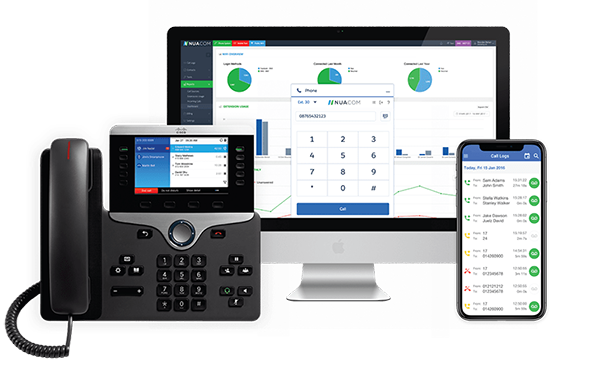In a world that’s increasingly more connected, missing a phone call or not looping in an important employee or staff member into a conversation can be trouble for any small business. Add to that the need to keep overhead costs down, and it’s easy to understand why companies are looking around for the next best thing.
Why Landlines and Cellular Aren’t Up to the Task
Landlines are quickly becoming a relic of the past. Because as more and more companies (and private citizens) move to cellular and digital services, businesses that offer and maintain landline service are shrinking. And so are their resources. Even for owner/operator micro-companies who don’t need more than just one phone line, landlines are being left behind since they keep the worker tied to one location. They also aren’t as reliable as other types of voice communication services.
Cellular phones have much more flexibility, and companies can customize their plan to easily include as many phones as they wish. However, these plans quickly become expensive and scaling them up and down can cost even more money. Not to mention the additional hardware costs that come with the next exciting new features. Many cellular companies include hardware upgrades in their plans, but these costs quickly add up when you manage more than a few phone lines.
These reasons are exactly why Voice over Internet Protocol (VoIP) was not only created, but also why it’s on the rise as the most efficient and cost-effective phone solution for business.
Why VoIP is Superior
Versatility
Since VoIP services are now in high demand, there are many VoIP service companies working feverishly to enhance the use of this technology. They are bundling up other communication applications into a single unified platform to increase efficiency. This means they’re bringing all modes of communication—such as voice, fax, video, web conferencing and email—to be bounced between in a single software application.
Flexibility
The ability of this application to convert voice into an email or fax into an email can bring an impressive amount of efficiency to operations. You don’t need to sign up for a separate service for a telephone or video conference. An incoming phone call can be received on a mobile phone and regular phone simultaneously. That means there are fewer missed important phone calls, and less wasted time on ‘phone-tag.’ An employee can receive an important fax on a laptop while sitting in a café or within range of a Wi-Fi hot spot, and they can redirect it to an associate within minutes with a few keystrokes.
Reduced cost: This is probably the biggest reason that small businesses switch to VoIP. And there are a few aspects to the cost savings.
- Cost per phone call
Making long distance or international phone calls using landlines or mobile phones can be very expensive. Charges billed at per-minute rate can add up quickly. When you do business from multiple locations, VoIP applications allow you to make calls directly from PC to PC, and these are free if they are within the same technology network. You can also pay a low monthly flat-fee and make an unlimited number of calls, including international calls, which means much less usage of your mobile phone minutes. - Operational costs
You don’t need separate networks, servers, or databases for communications. Everything can be done using the same data network, and specially designed phones with VoIP technology can be managed right from your desktops. There are a few things at work here: First, you have the potential to eliminate traditional landlines, which usually have a significant monthly fixed cost, in addition to the per minute usage costs. Another operational cost that goes away are the labor costs involved in moving employees from office to office. Reconfiguring numbers and phones can still require physical changes. Even if they are only software changes, there is a cost to pay the technician and/or vendor who handles these reconfigurations. - Infrastructure cost
With VoIP your infrastructure cost is greatly reduced. For example, using landline or cellular phones, you have to pay more for the extensions because they require a device. But using VoIP allows you to run and use those extensions right from your computers. For those who like as flexibility without the need for extra hardware, dual-mode phones allow the user to switch from a cellular to a local Wi-Fi environment, so you only need a mobile phone. That means fewer devices to manage.
Moving Now Means Saving Money Faster
Companies delay moving because bringing on a new technology (even one what plugs in quickly and easily into your network) can seem like a big managerial undertaking or like it may require time that you don’t have. Honestly, it’s neither. Once we understand how you use your phones and what you want your ideal world to look like, we handle the rest. Contact us to find out how easy it can actually be.

